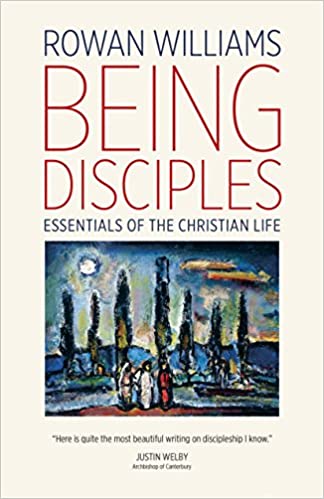This week we will be discussing Chapter 2 – Faith, Hope, and Love – of Archbishop Rowan William’s devotional Being Disciples: Essentials of the Christian Life. In his discussion of love, Dr. Williams points out that the modern church has forgotten the eros understanding of Divine Love. Love can be defined in different ways: Agape is gratuitous benevolence love, Kenosis is a self-emptying love (Phil 2:7), and Eros is an acquisitive desirous love. These three understandings of love do not differ in substance but only from our perspective. When we look towards the past, we see God’s love as agape. God’s creation and disposition of his prevenient grace upon us appear as Agape. God’s Incarnation in God’s abandoning himself of himself for our benefit appears as Kenosis. But God’s very present activity in our lives in recalling us to himself and joining us to himself is Eros. From the eternal perspective of God outside of time and causation, there is no distinction between God’s beneficent giving to us and God’s acquisitive taking of ourselves into him. God in Christ fully gives of himself to us so that we will reciprocate. I have attached a very short excerpt from Eric Perl’s book Theophany (p.47) which discusses this interrelationship between agape and eros.
God’s eros is present throughout Scripture. The prophets continuously describe God’s relationship with Israel as that between a husband and a wife. The Songs of Songs made it into Scripture because it was interpreted as a love poem between God and Israel or Christ and his Church. Jeremiah describes his calling as God’s illicit seduction. Jer. 20:7. Paul describes Christ’s relationship to the Church as that between a husband and his bride. Eph. 5:21-38. And Paul’s observation that “it is no longer I who live, but Christ who lives in me” (Gal. 2:20), is a statement of God’s eros which has fully overcome Paul and brought him into union with God. The entire story of Scripture is God’s acquisitive pursuit of his creation and God’s willingness to do whatever it takes to have that acquisitive desire fulfilled, even to the point of his putting on flesh and dying on the cross. Eros is the hero of the Story sacrificing everything that he has, even his very life, in order to obtain the person whom he desires. This is our story.
This eros of God is the source of our transformation from death into life. In his book, Erotic Phenomenon (section 3, attached), Jean-Luc Marion, a French post-modern Roman Catholic philosopher, presents the argument that only through love, and not our will, are we fully human. To be is to be-loved. Marion begins his work with a critique of Renee Descartes’ statement “I think therefore I am.” Modernity is based upon this essential understanding that an individual’s cognition is the very basis of his identity. I have a thinking intentional will that can choose and therefore I am an individual and I am a person – cogito, ergo sum. For Marion, Descartes and modernity itself reduce the individual to pure vanity where everything, including oneself, is reduced to an object of inquiry and useless certainty. (We see a similar conclusion reached in Ecclesiastes.) Alternatively, Marion asserts that I truly exist only in so far as I love or, more exactly, only in so far as I am loved. It is only when I completely give of myself and empty myself to another and experience that reciprocity that I am truly human and do I truly exist. Only in loving and being loved can I be transformed from my present state.
Husbands, love your wives, as Christ loved the church and gave himself up for her, that he might sanctify her, having cleansed her by the washing of water with the word, that he might present the church to himself in splendor, without spot or wrinkle or any such thing, that she might be holy and without blemish. Eph. 5:25-27
Ephesians 5:25-27

